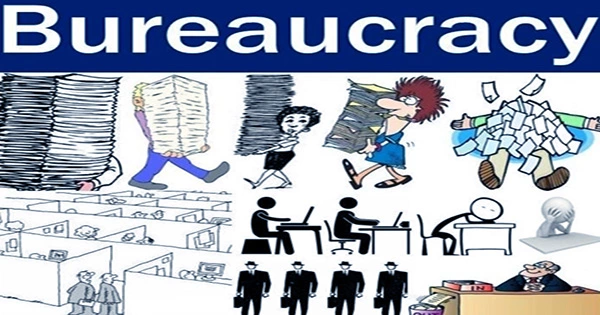Both a collection of non-elected leaders and an administrative policy-making body are referred to as bureaucracies. A bureaucracy, historically, was a form of government administration where departments were run by non-elected people. Any significant institution today, whether it is privately or publicly held, is governed by bureaucracy. Bureaucracy is exemplified by the public administration in many jurisdictions and sub-jurisdictions, but it may also be seen in any institution with a centralized hierarchical structure, such as hospitals, academic institutions, commercial businesses, professional societies, social clubs, etc.
Compared to informal and collegial groups, it is distinct. Bureaucracy is best when it is impersonal, logical, and founded on laws rather than on affiliations with family, friends, patriarchal, or charismatic authorities. Both governmental and private institutions use bureaucratic organizations.
Bureaucratic Theory:
According to Max Weber’s thesis, organizations might have three different sorts of power: traditional power, charismatic power, and legal power. He describes the latter as a bureaucracy in his theory of bureaucracy.
A democracy is structured around norms and laws, which makes the idea of established jurisdiction dominant.
The three factors listed below assist bureaucratic management:
- All regular activities within a bureaucracy can be regarded as official duties;
- Management has the authority to impose rules;
- Rules can easily be respected on the basis of established methods.
Advantages: Generally speaking, the word “bureaucracy” carries a negative connotation and is frequently associated with big businesses and government institutions. However, a bureaucracy has the significant advantage of allowing large organizations with numerous hierarchical levels to become structured and function efficiently.
All personnel can complete their work with high consistency and efficiency thanks to the set norms and processes. All of this facilitates management’s ability to maintain control and implement changes as needed. In organizations where legislation plays a significant role in producing a consistent output, bureaucracy is especially unavoidable.
Disadvantages: Due to its numerous hierarchical layers, bureaucracy is characterized by a lot of paperwork, red tape, desks, a particular office culture, and slow bureaucratic communication. This is a bureaucratic organization’s major systemic flaw. Unfortunately, employees continue to maintain a reasonable degree of separation from one another and the company, which reduces their loyalty.
Compliance with laws and other regulations is also crucial to the functioning of the bureaucracy. This limits employees’ ability to think creatively and makes them feel like a number rather than a unique person. Later studies (based on the human relations theory) showed that workers value attention and want to participate in decision-making.
















